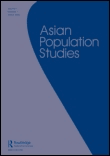
Asian Population Studies
Scope & Guideline
Empowering Scholars with In-depth Demographic Insights
Introduction
Aims and Scopes
- Demographic Changes and Trends:
The journal extensively covers various demographic changes, such as fertility rates, migration patterns, and aging populations, providing analyses that inform policy and societal understanding. - Socioeconomic Influences on Population Dynamics:
Research often investigates how socioeconomic factors, including education, employment, and income levels, impact demographic behaviors and trends across Asian countries. - Gender Studies in Demography:
The journal highlights gendered aspects of demographic issues, including gender inequalities in labor, marriage, and family dynamics, contributing to a deeper understanding of societal structures. - Health and Well-being in Population Studies:
There is a strong focus on the intersection of demographic trends with health outcomes, particularly in relation to aging populations, mental health, and the effects of pandemics. - Cultural and Regional Variations:
The journal emphasizes the importance of cultural context in understanding demographic phenomena, showcasing research that reflects the diverse experiences of different Asian societies.
Trending and Emerging
- Impact of COVID-19 on Demographics:
There is a growing body of work examining how the COVID-19 pandemic has reshaped demographic trends, including fertility rates, migration patterns, and mental health outcomes. - Gender and Work-Life Balance:
Research focusing on gender roles, particularly in the context of work-life balance and domestic labor, is gaining prominence, reflecting societal changes in gender dynamics. - Aging Populations and Policy Responses:
The challenges posed by aging populations are increasingly becoming a focal point, with studies exploring policy responses and societal adaptations to support older adults. - Migration Dynamics in a Globalized World:
Emerging themes related to migration include the complexities of skilled migration, integration challenges, and the socio-economic impacts of migration on both sending and receiving countries. - Socioeconomic Disparities and Health Outcomes:
An increased emphasis on the relationship between socioeconomic status and health outcomes is evident, particularly in understanding disparities in health access and quality across different populations.
Declining or Waning
- Traditional Fertility Studies:
While fertility remains a key area of study, the prevalence of traditional fertility analyses has declined, with more emphasis now being placed on the socio-cultural factors influencing fertility decisions. - Static Migration Patterns:
Research on static migration patterns and traditional migration flows has decreased, as newer studies focus more on dynamic migration trends and the implications of temporary and circular migration. - Focus on Rural Demographics:
The examination of rural demographic issues has become less frequent, possibly overshadowed by urban-centric studies that address the rapid changes in urban populations and migration. - Historical Demographic Analysis:
There is a noticeable reduction in studies that focus on historical demographic trends, with a shift toward contemporary issues arising from recent events like the COVID-19 pandemic. - Elderly Care in Traditional Contexts:
Research on traditional elderly care practices is diminishing, as newer studies tend to address modern care challenges and the implications of aging in a rapidly changing demographic landscape.
Similar Journals

POPULATION RESEARCH AND POLICY REVIEW
Fostering Dialogue Between Demographic Research and Policy MakingPopulation Research and Policy Review is a prestigious journal published by Springer, specializing in the fields of demography and policy analysis. Established in 1982, this journal has developed a significant reputation within the academic community, currently holding a Q1 ranking in Demography and a Q2 ranking in Management, Monitoring, Policy, and Law as of 2023. With a robust Scopus ranking of #34 out of 139 in Demography and a readership that spans multiple disciplines, this journal serves as a critical platform for researchers, professionals, and policymakers to disseminate their findings and insights related to population dynamics and policy implications. Although not an open-access journal, Population Research and Policy Review provides vital research that influences both theoretical frameworks and practical applications in social sciences and environmental management. The journal’s ongoing commitment to high-quality, peer-reviewed scholarship makes it an indispensable resource for those seeking to understand and address contemporary demographic challenges.

JOURNAL OF POPULATION ECONOMICS
Pioneering Research at the Intersection of Demography and EconomicsThe JOURNAL OF POPULATION ECONOMICS, published by SPRINGER, stands as a leading peer-reviewed journal in the fields of demography and economics. Established in 1988, this esteemed journal offers a platform for high-quality research that probes the intricate relationships between population dynamics and economic phenomena. With its impressive Q1 quartile ranking in both Demography and Economics and Econometrics for 2023, the journal is recognized as a vital resource for scholars and practitioners alike, reflecting its rigorous standards and impact in the academic community. Its Scopus rankings position it within the top tiers of social sciences, making it an essential read for those engaged in demographic and economic research. Although the journal does not currently adopt an open access model, its esteemed reputation and continuous publication until 2024 ensure relevant and up-to-date findings contribute meaningfully to scholarly discourse. At its core, the JOURNAL OF POPULATION ECONOMICS aims to bridge theoretical insights and empirical findings, fostering an understanding of how population changes influence economic outcomes and vice versa.

Demografie
Transforming data into understanding of human populations.Demografie is a distinguished academic journal published by the Cesky Statistical Office in the Czech Republic, serving as a vital platform for scholars and practitioners interested in the multifaceted field of demography. Established in 1976 and consistently contributing until 1999, with a renewed focus from 2014 to 2024, this journal engages with critical issues such as population dynamics, migration patterns, and socio-economic factors influencing demographic changes. For its impactful research contributions, it holds a Q3 category ranking in Demography for 2023, with a Scopus rank of #89 out of 139 in the Social Sciences category, reflecting its credibility and relevance in the field. Although it operates under traditional access, its insightful articles and comprehensive analyses remain valuable resources for researchers, professionals, and students eager to deepen their understanding of demographic trends and policies. The journal's commitment to advancing demographic knowledge makes it an essential read for those navigating the complexities of population studies.

Population Review
Exploring the Dynamics of Population ChangePopulation Review, published by Sociological Demography Press, is a vital resource in the field of demography, contributing to the understanding of population dynamics and trends since its inception in 1988. With an ISSN of 1549-0955 and an E-ISSN of the same number, the journal has played a significant role in disseminating scholarly research and analysis relevant to demographic changes and their implications. Although currently categorized in the Q4 quartile, it ranks 78th out of 139 in the Scopus Social Sciences: Demography category, placing it within the 44th percentile among its peers. This journal serves as a platform for researchers, professionals, and students to engage with contemporary population issues, encouraging the exploration of new theories and methodologies. While not available as open access, its robust editorial standards and commitment to rigorous research make it an invaluable addition to the libraries of demographers and social scientists alike.

Canadian Studies in Population
Advancing Knowledge in Population StudiesCanadian Studies in Population, published by Springer, is a prestigious journal dedicated to advancing the field of demography and the history of population studies within Canada and beyond. With an ISSN of 0380-1489 and an E-ISSN of 1927-629X, this journal has proudly contributed to scholarly discourse since its inception in 1975, and continues to make significant impacts through its rigorous research articles and comprehensive reviews. Recognized for its high academic standards, it boasts a Q2 ranking in Demography and a Q1 ranking in History in 2023, reflecting the journal's critical role in shaping contemporary understanding of demographic trends and historical population developments. With a Scopus rank of #51/139 in Demography and #83/1760 in History, it appeals to a diverse audience including researchers, professionals, and students eager to explore population dynamics, historical context, and societal implications of demographic shifts. While the journal maintains traditional subscription access options, its rigorous peer-reviewed content ensures that it remains a cornerstone for scholars seeking credible and influential insights in their respective fields.
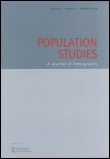
POPULATION STUDIES-A JOURNAL OF DEMOGRAPHY
Navigating the Intersections of Population Studies and HistoryPopulation Studies: A Journal of Demography is an esteemed scholarly publication dedicated to advancing the understanding of demographic trends and their historical contexts. Published by Routledge Journals, Taylor & Francis Ltd, this journal has a notable impact in its field, recognized as a Q1 category journal in both Demography and History as of 2023. Its Scopus rankings highlight its significance, featuring a remarkable 12th place rank in Arts and Humanities—History and 19th place in Social Sciences—Demography, both underscoring its influential role in academic research. Established in 1947, the journal has consistently contributed to the discourse in population studies, offering a platform for innovative research and critical analysis. While it does not provide open access options, it remains a vital resource for researchers, professionals, and students who seek to explore the complex relationships between population dynamics and historical narratives. Its comprehensive coverage from 1947 to 2024 ensures a rich repository of knowledge, making it essential for anyone involved in demographic research.
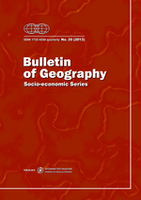
Bulletin of Geography-Socio-Economic Series
Exploring the dynamic interplay of geography and socio-economics.Bulletin of Geography-Socio-Economic Series, published by Nicolaus Copernicus University in Torun, Poland, is a premier Open Access journal dedicated to enhancing interdisciplinary discourse within the fields of geography and socio-economics. Since its inception in 2003, the journal has garnered significant recognition, achieving a Q1 ranking in Cultural Studies and notable placements in other categories, affirming its impact on the academic community. The journal provides valuable insights and research findings with the aim of fostering a deeper understanding of socio-economic trends and their geographical implications. Its commitment to Open Access since 2008 underscores its dedication to disseminating knowledge widely, making it an essential resource for researchers, professionals, and students alike. With an accessible online format and a solid reputation reflected in its impressive Scopus ranks, the Bulletin of Geography-Socio-Economic Series plays a pivotal role in shaping contemporary discussions in social sciences, facilitating knowledge exchange across borders.
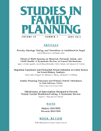
STUDIES IN FAMILY PLANNING
Advancing knowledge in family planning and reproductive health.STUDIES IN FAMILY PLANNING, published by WILEY, is a renowned journal that serves as a critical resource in the fields of Demography and Social Sciences. With an impressive Q1 ranking in both categories, it is recognized for its high impact and influential contributions to the understanding of family planning dynamics, reproductive health, and population studies. The journal has published scholarly articles since 1970, reflecting its long-standing commitment to advancing knowledge and research in these important areas. Currently holding a rank of #27 out of 139 in Demography on Scopus, the journal's 2023 impact factor underscores its influential role in shaping policy and practice worldwide. Though it operates under a subscription model, it is readily accessible to members of the academic community, including researchers, professionals, and students dedicated to improving family planning systems and socio-demographic studies.
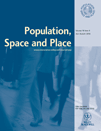
Population Space and Place
Bridging Research and Real-World ApplicationsPopulation Space and Place is an esteemed academic journal published by WILEY, dedicated to advancing the fields of demography and geography, planning, and development. With an impressive 2023 impact factor and categorized in the top quartile (Q1) for both demography and geography, this journal serves as a vital platform for researchers, professionals, and students seeking to explore the spatial dimensions of population dynamics. Founded in 2004 and running through 2024, it has established itself as a significant contributor to scholarly discussions, evidenced by its high Scopus rankings, including rank #18 out of 139 in demography and #165 out of 821 in geography and planning. While the journal currently does not offer open access, it remains a key resource for those involved in academic research and policy formulation. With its focus on the interplay between population trends and spatial analytics, Population Space and Place is essential for anyone aiming to understand the complexities of population geography in a rapidly changing world.

Espaces-Populations-Societes
Advancing Knowledge in Population and GeographyEspaces-Populations-Sociétés is a distinguished journal published by UNIV LILLE I SCI & TECH, focusing on the fields of demography and geography. Established in 1983, this open-access journal has committed itself to providing a platform for innovative research and discussions around population dynamics and spatial organization, with accessibility to its content available since 2004. Based in France, at the UFR Géographie & Aménagement, the journal plays a crucial role in advancing understanding of demographic trends and planning developments. With current Scopus rankings highlighting its position in the 25th and 14th percentiles for Demography and Geography, Planning and Development respectively, it maintains a reputable standing within academic circles, establishing its importance in contemporary research landscapes. Researchers, professionals, and students alike will find valuable insights in its comprehensive overview of sociocultural and environmental interactions, as well as place-based issues at the heart of societal development.